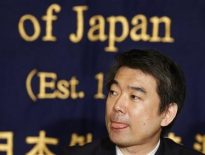ADDIS ABABA, Ethiopia (AP) — U.S. Secretary of State John Kerry straddled the diplomatic boundary this weekend between presenting the best face of America and a misleading one.

In a question-and-answer session with young Ethiopians on Sunday, Kerry exaggerated the U.S. record on climate change, appeared to conflate past U.S. policy on drones with President Barack Obama’s new policy and gave an incomplete account of how he opposed the Iraq war. A day earlier, he struggled with economic data as well as the contents of his own department’s terrorism blacklist.
Here’s a look at how some of his statements measured up against the facts:
—
KERRY on drones: “The only people that we are going after are confirmed terrorist targets, at the highest level. … We will not fire when we know there are children or collateral damage. … I am convinced that we have one of the strictest, most accountable and fairest programs.”
THE FACTS: President Barack Obama’s recently amended drone policy includes some of these elements, but that was not always the case. According to the New America Foundation, the CIA and U.S. military have killed 3,364 militants and civilians with drones over the last decade. Although the number of noncombatants killed is not known, the dead have not all been “highest level” terrorists.
The New America Foundation maintains a database of the strikes and compiles its numbers from reports in major news media that rely on local officials and eyewitness accounts. It estimates that one in five of those killed by drones is a noncombatant. The Obama administration says the number of civilians killed is in the single digits. As for comparisons, no other country is known to use armed drones to kill individuals in foreign lands.
—
KERRY: “I opposed the president’s decision to go into Iraq.”
THE FACTS: This is a simpler account of his complex position on the Iraq war than the one that caused him grief in his 2004 Democratic presidential campaign against President George W. Bush. Speaking during the campaign about money for the war, Kerry declared, “I actually did vote for the $87 billion before I voted against it.” Critics shorthanded this comment to “I was for it before I was against it,” painting him as a flip-flopper. Although Kerry turned against the war, two years earlier he had voted to give Bush, in his words, “the authority to use force, if necessary, to disarm Saddam Hussein.”
—
KERRY on climate change: “We’re below the Kyoto levels now.”
THE FACTS: The 1997 Kyoto Protocol, which the Clinton administration signed but never won ratification for, called on the U.S. to cut its greenhouse gas emissions 6 percent from 1990 levels. Although a natural gas surge and economic woes have helped the U.S. lower emissions, they were still up some 9.5 percent from 1990 to 2011, the last year for which full data is available. Kerry also said the country met a target to cut emissions by 17 percent from 2005 levels by 2020. Government data shows about a 7 percent reduction from 2005 to 2011.
—
KERRY on talking with terrorists: “The requirement for the Taliban to come to the table was that they agree that they will not engage in violence against other people and violence against other countries; they won’t engage in terrorism and they will not threaten the Afghanistan constitution and so forth.”
THE FACTS: Those are the conditions the U.S. laid out for any peace agreement with the Taliban. But it held talks with the Taliban in 2011 without ever securing an agreement from their militants to drop their fight or endorse Afghanistan’s constitution.
—
KERRY on what legacy he might leave in Africa: “I’m here to try to help. President Obama wants to try to help. And maybe our legacy will be what we do to try to help. I think of what we’ve done with PEPFAR. I was proud. I wrote that legislation.”
THE FACTS: To be clear, the $48 billion President’s Emergency Plan for AIDS Relief, or PEPFAR, started in 2003 under Bush and therefore is part of his legacy. Obama also has embraced the effort. Then-Sens. Kerry and Bill Frist laid the groundwork for the program. So in speaking about what “we’ve done” to expand AIDS prevention, treatment and support programs in countries hit by the epidemic, Kerry meant the U.S. over two administrations, not the Obama administration alone.





